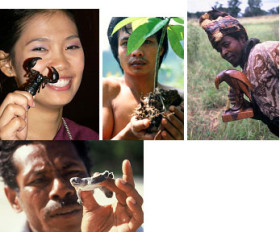Travels in Search of Eco-Dharma
Posted on 02. May, 2010 by Paul Sochaczewski in LECTURES

An Indian businessman creates a sacred forest in downtown Bangalore. An aging elephant hunter in Vietnam captures 298 wild pachyderms before retiring with a lucrative product endorsement scheme. An elderly woman in northern India is angry at the Hindu god Hanuman for stealing the village’s medicinal plant mountain. A prominent western-educated sultan of Java offers fingernail clippings to his ancestor–a mermaid queen representing fickle and passionate natural forces. Burmese generals use the perceived power of the white elephant to solidify their hold on power. Two important Hindu figures-Garuda and Naga-trace their origins to real-life natural antagonists, the eagle and king cobra. A 19th century British naturalist in Asia pickles, pins, stuffs and catalogues some 125,000 “natural productions” in his attempt to understand evolution. An American researcher tries to gauge the intelligence of a rehabilitant orangutan, and by extension, his own humanity. A near-naked Penan tribesman in eastern Malaysia stands up to the timber companies which are destroying his rainforest home. A simple but wise woman in the Himalayas tells how hugging a tree changed government conservation policy.
In my 40 years of wandering around Asia, I’ve encountered people who relate to nature in countless ways – some relationships are destructive, some respectful. I call this bond Eco-Dharma. I don’t use the resonant term “dharma” in any religious context, where the phrase refers to rules, laws and rituals, but rather as a secular way to illustrate that people have different views of the truth and take various paths to come to terms with their relation to nature.
Our bond with the natural world has been molded by four eco-cultural revolutions which have changed forever the way we see and use and abuse and pray to nature.
Like most life journeys, this presentation might at times be messy, rambling, provocative, silly and tearful. Lots of pictures, ideas, adventures, that might help viewers draw their own natural road maps.
